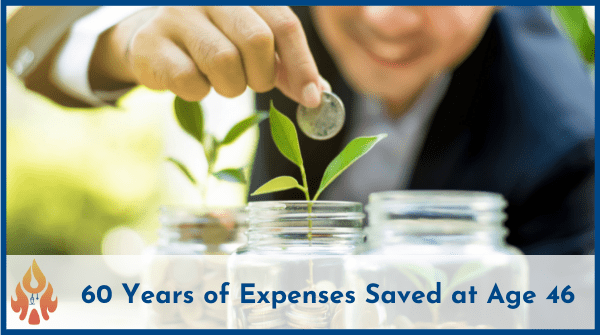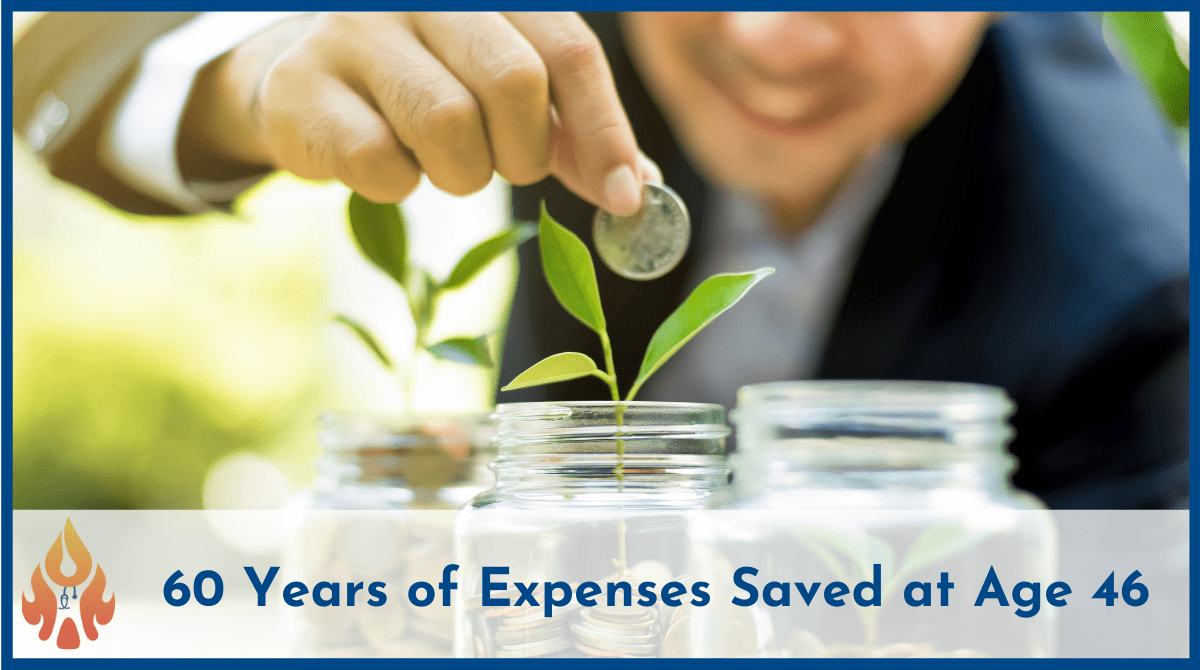Some people retire when they reach a certain net worth number. Others have a particular age as their primary target.
Today’s interviewee, a preventive medicine physician, has put herself in a position to retire at any time, but she’s delayed her eventual departure from medicine after blasting past her original FIRE goal number.
She’s discovered the key to career longevity, and I wouldn’t be terribly surprised if she sets another new goal after reaching her current goal of $5 Million.
If you’re interested in participating in one of three interview series, please download the most appropriate form for your life situation: FIRE Starter, FIRE Crossroads, or Post-FI Notes. To see other posts in the series, visit our Q&A archive.

Getting to Know You
Where are you on your financial independence journey? Have you crossed the halfway point in terms of net worth and/or passive income?
I decided to pursue FIRE in earnest about four years ago. I arrived late to the saving and investing party, but I like to think that I’ve caught up nicely. I’ve whittled down my spending to ~$50,000 to 60,000 a year, which means my savings rate is 85-90%.
I’ve kept driving my 14-year old car with only 56,000 miles on it and own two homes free and clear. My student loans are long gone, and I have zero debt except for a credit card which is paid off monthly.
While the idea of retiring early makes me nervous, I am where I’d like to be in terms of net worth for my age. I still need to figure out the passive income piece; being a landlord is not appealing so I don’t rent my properties at all.
I’d also like to beef up my brokerage account as the bulk of my savings is in pre-tax accounts. All of this needs to happen before stepping back from full-time work.
Tell us about your household. How many people and at what ages? Are you supporting anyone outside of your home? Where do you live?
I am a 46-year old female living in a southern US state. I live with my significant other (56 y.o.) but have not included his finances here since we keep them separate. We have no dependents, and our parents are in good shape financially.
In what field are you working? How is your career going? What do you like best and least about your chosen profession?
I did my medical training in preventive medicine, one of the more obscure medical specialties that seems to be having a moment now that public health is a hot topic.
I’ve spent the 16 years since then working in prevention, clinical trial design, execution, and medical oversight. The first several years were with the US federal government and the last handful have been in industry where I work from home full-time (even pre-pandemic!).
More recently, I have moved over to the business side of clinical trials and enjoy engaging clients in the early stages of their clinical trial planning.
I must say one of the big advantages of my profession is that I have never had to truly take call or work evenings or weekends. My job is not a physically exhausting one and doesn’t encroach on my personal time, as I have no direct patient care responsibilities.
I’ve also contributed to very high-profile clinical trials and COVID-related studies during the pandemic which has kept life interesting and hopeful. I genuinely like what I do and the people I work with.
That has not always been the case, but I kept adjusting my employment circumstances until I was happy. Ooooh- I think I may have just stumbled upon the secret to career fulfillment even though this is a post about FIRE!
Do you feel you’ve come to a crossroads of sorts? If so, tell us about it. What options are you contemplating?
I do have other interests besides public health research that I’d love to devote more time to. If the pandemic has taught us anything, it’s that life is both fragile and short. As physicians, we’re more acutely aware of this than most.
I’d like to continue working for another 4-5 years at least, and then transition to part-time work. I also have a side gig that I want to develop. Who knows, maybe that will end up being my part time “retirement” job!
How is your nest egg invested? Approximately what percentage is allocated to stocks, bonds, real estate, and alternatives?
- 25% Real estate
- 10% Cash (way too much, I know)
- 1-2% bonds
- ~62% index funds, individual stocks, etc.
- a smidgen of Crypto
All of this minus debt results in a net worth of $3.34 Million
Are your investments primarily in tax-deferred, Roth, or “taxable” post-tax accounts?
- Roth 1.8%
- Tax deferred 33.5%
- Taxable accounts including cash: 25.7%
- Company stock (fully vested in next 2 years): 15.6%
- Real Estate (2 properties): 23.4%
Do you have investments in an HSA? How about 529 Plans?
I don’t have either.
What has been your best investment?
The TSP I accumulated from years as a federal employee has been a low-cost and well-performing retirement account. I’ll have a small pension coming my way as well.
I also recently started making mega backdoor Roth IRA contributions, and I’m praying Congress doesn’t kill this wonderful way to save for retirement!
Lastly, there are several stocks that have performed incredibly well (NVIDIA, UNH and my company’s stock, to name a few).
Your worst investment?
My worst investment has been the money I spent on stuff in my earlier years rather than saving and investing. I also spent an inordinate amount of money on travel in my 20s and 30s, visiting over 40 countries and every continent except Antarctica.
While that spending was massive- we’re talking multiple safaris, cruises, visits to several wonders of the world, etc., I consider it an investment and have zero regret, especially with the state of travel these days.
Into the FIRE
Numerically, what is your FI goal?
I’d like to see my net worth at a minimum of $5 mil. I’ve hit my previous FIRE target already, but with inflation, the goalpost has been adjusted.
I’m clearly suffering from “one more year/million syndrome”!
When do you suspect you will achieve financial independence? Will you retire from your career once you’re comfortably FI?
According to every online calculator I’ve used, I am already FI but plan to keep working for the time being.
I could coast FIRE or Lean FIRE right now, but the field I am in is just too interesting to walk away from at the moment. It also happens to be quite lucrative and will allow me to pad my brokerage account.
What are your post-FI plans? How will your life change? What do you look forward to the most?
I like the idea of an encore career and suspect I will work at something when I “retire,” albeit sprinkled with a lot more free time and travel. Heck, I might even write a book!
I’ve taken a very non-traditional path in medicine. In fact, I remember the exact moment when a medical school colleague told me about Preventive Medicine as a medical specialty. A light bulb went off.
Why did it take a random interaction to figure out that I could make a career impacting millions of lives through public health and clinical research?
It’s amazing to me that doctors don’t know the full breadth of professional opportunities available to them beyond clinical medicine.
Like financial literacy, this just isn’t taught in medical school. These are legitimate career paths in their own right and not just careers to “fall back on” after burning out from patient care.
Coaching physicians through these types of career choices and transitions could be a very viable and enjoyable second career for me one day (or side hustle, perhaps!)
Are you facing any unique challenges making FI or RE more difficult?
Inflation! Enough said.
What advice do you have for others who are seeking financial independence?
I am sure you’ve all heard this before, but living below your means, avoiding most forms of debt, and prioritizing spending on experiences rather than stuff can take you a really long way towards FI.
If you’re able to maximize your earnings and hence savings and investments in tandem with these changes, you are golden. To make this process more enjoyable, choose meaningful work that genuinely interests you.
Finally, is there anything under the sun that you’d like some help with? The hive mind would be happy to weigh in.
I’ve got too much cash on hand and would love to hear about investment and passive income ideas that have worked for you.
I also want to devise a plan for drawing down assets when I retire early (eventually). Any recommendations?
PoF: Catch all the future interviews from those just getting started, at a crossroads, or at the end of their FI journey with a free subscription to Physician on FIRE.
I thank today’s interviewee for sharing their story, and I’ve shared my feedback privately with them. I wouldn’t want my opinions to influence yours. Please give your take and answer any questions they have had in the space below!
Again, if you’d like to partake in a future Q&A, please download a FIRE Starter, FIRE Crossroads, or Post-FI Notes interview form.












5 thoughts on “FIRE Crossroads 021: 60 Years of Expenses Saved at Age 46”
Great interview, and great job getting to where you are. My two cents on what to do with the excess cash, look into real estate syndications. PoF has a review of many he invested in, I am looking at putting 100k into 37th Parallel Properties, I like their approach for where I am in my career/investing stage, but PoF reviews many with lower amounts needed to enter this area of investing.
Yes, you have the two properties now, which means one could be sold if needed, but you are not using it to create passive income, you are benefiting from its use and I suspect appreciation. WCI recently had a podcast that pointed out the difference of things in your net worth vs retirement investments you plan to live off of, I would put your two current properties in the former, not the latter.
I’m so impressed you were able to squirrel away that much money based on your income alone and not including your spouse. Is your $50-60,000 annual spending just yours or combined?
I am in a dual physician household with three kids. It means we make more so we can save more but I feel our annual expenses could be reined in a bit (a lot).
They keep finances separate, so that’s just her expenses. I don’t know if it includes half of housing, half of food, etc… it might be good to see a breakdown of that.
I would love if you could write a little bit on how one might get into preventative medicine. It might be the perfect transition for docs trying to get out of clinical medicine but who still want to have an impact.
Hi there,
Thanks for your note! There are multiple Prev Med programs throughout the US; check out the ACPM website for a complete list. If you’ve already completed a residency and have an active medical license this would be an additional 2 years of training. You will obtain an MPH degree as part of your training, which involves coursework and a thesis project. I’ve been happy with this career choice and would highly recommend it!